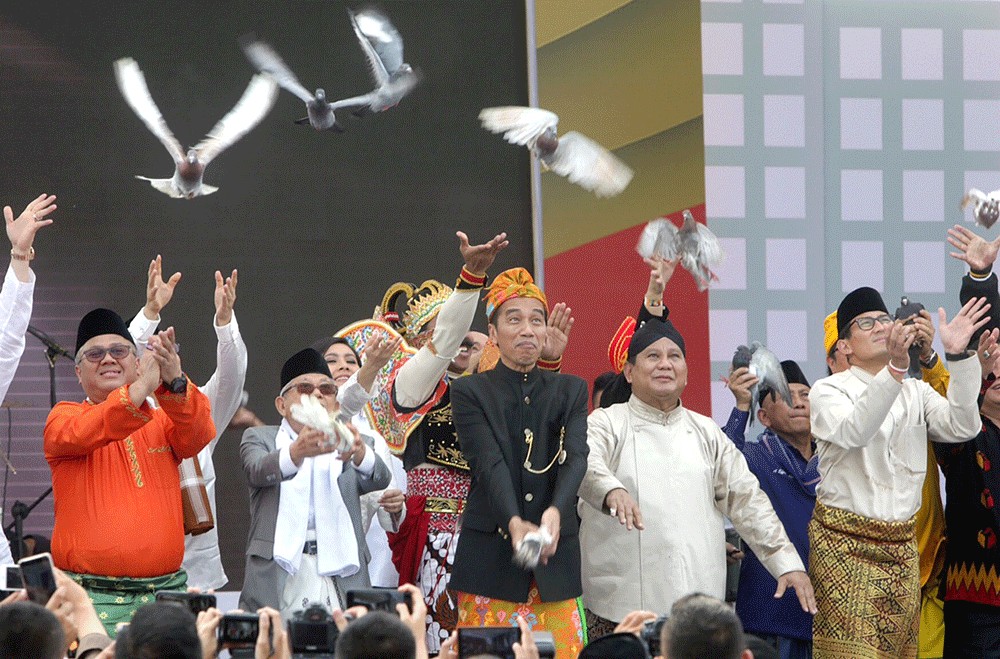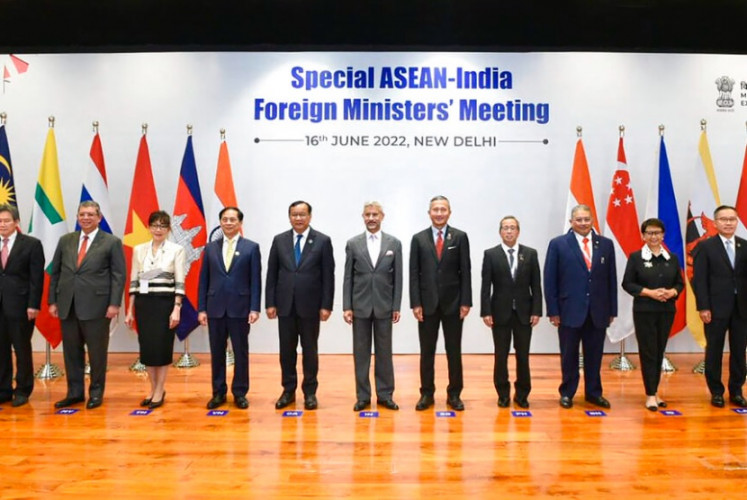Downside risks to economy
Indonesia lacks “political space” for a new round of painful reforms until the general elections on April 17, 2019.
Change Size
 Give peace a chance: President Joko “Jokowi” Widodo (center), who is running for a second term, and his running mate Ma’ruf Amin (second left), along with presidential candidate Prabowo Subianto (second right) and his running mate Sandiaga Uno (right), release pigeons during a peace declaration for the 2019 election campaign at the National Monument in Jakarta on Sunday. With the declaration, the campaign
period for the presidential election, scheduled for April next year, offi cially kicked off , pitting Jokowi once more against his opponent in the 2014 election. (The Jakarta Post/Wendra Ajistyatama)
Give peace a chance: President Joko “Jokowi” Widodo (center), who is running for a second term, and his running mate Ma’ruf Amin (second left), along with presidential candidate Prabowo Subianto (second right) and his running mate Sandiaga Uno (right), release pigeons during a peace declaration for the 2019 election campaign at the National Monument in Jakarta on Sunday. With the declaration, the campaign
period for the presidential election, scheduled for April next year, offi cially kicked off , pitting Jokowi once more against his opponent in the 2014 election. (The Jakarta Post/Wendra Ajistyatama)
E
ven though the latest report of the International Monetary Fund predicts that global growth will remain steady this year, and in 2019, at last year’s 3.7 percent expansion rate, the multilateral institution points to the writing on the wall for several emerging economies.
The latest IMF “World Economic Outlook” report released at the IMF-World Bank Annual Meetings in Bali on Tuesday hints at possible further negative shocks to growth prospects. A similar warning was also conveyed by the IMF “Global Financial Stability Report” released last week, pointing out that the tightening United States’ monetary policy, coupled with trade uncertainties, have discouraged capital inflows to emerging economies, weakened their currencies and depressed equity markets.
Even though Indonesia is not included in the IMF list of most vulnerable economies (Argentina, Brazil, South Africa and Turkey), as its economic fundamentals and its financial sector stability are now much stronger than during the 1998 Asian economic crisis and the 2008 global financial crisis, it is by no means a time for complacency. The IMF has also revised down its forecast for Indonesia’s growth.
The rupiah has indeed been under strong downward pressure, especially over the last three months, as a result of monetary tightening and stronger economic growth in the US, which has caused higher capital outflows, and the upward trend in international oil prices, which has increased Indonesia’s trade deficit and consequently the current account deficit to more than 2.5 percent of gross domestic product (GDP).
The financial market volatility will likely continue next year, because the US Federal Reserve, after raising the federal funds rate by 25 basis points in its Sept. 26 meeting, nonetheless signaled another rate hike by the end of this year and maintained its projection for three rate hikes in 2019.
The risk of further capital outflows remains high for Indonesia, especially if oil prices continue to rise, and this is quite worrisome, because 40 percent of its fiscal deficit, although below 2 percent of GDP, is held by typically jittery foreign portfolio investors.
Indonesia’s public sector debt is still below 30 percent of GDP, but a prolonged rupiah weakening would have negative repercussions on macroeconomic stability. As IMF managing director Christine Lagarde warned, the 60 percent build-up in global debt by the public and private sectors to US$182 trillion over the past decade has raised the risk of global financial shocks.
The IMF as usual urged emerging economies to accelerate structural reform measures to strengthen their economic fundamentals in the long term. But Indonesia lacks “political space” for a new round of painful reforms until the general elections on April 17, 2019.
During the current election campaigning period, the longest the country has ever seen, everything tends to be seen through the prism of politics. But hopefully the opposition will not resort to bashing foreign investors, as inordinately nationalistic sentiment could set off stronger capital outflows.








